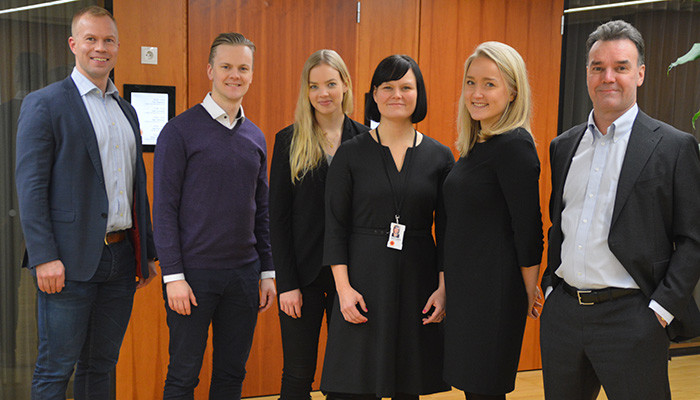Student project results in development ideas for Stora Enso’s internal control reporting
The final stage of a master’s degree in accounting includes a real-life business project.

At the School of Business, the final stage of the master’s degree in accounting includes a Capstone course in which the students work in small groups on management consulting for an agreed company or community. The final report, which the student teams present to the management of the organisation, must contain a summary and recommendations. About an hour is set aside for the final presentations to the companies.
‘We run the two-month long course twice a year. A number of projects have received excellent feedback from representatives of the commissioning company. The best team on each course receives an award. The clients in the last three winning cases have been Orion, Lindström and Stora Enso,’ said Assistant Professor Jari Huikku, who guided the winning group this autumn. Jari Huikku and Professor of Practice Jari Melgin are responsible for the course in the autumn, and in the spring, Jari Melgin is joined by Professor of Practice Olli-Pekka Lumijärvi.
Student projects fully in line with business needs
The autumn award went to a Capstone project for Stora Enso. Over the last two years, Stora Enso has been running a group-wide project to deliver the improved quality of internal control (IC) in alignment with the company’s transformation strategy. In the autumn, the project journey had come to the point where it was time to further develop executive IC reporting with a special focus on end user experience. A basis for the reporting is to provide Stora Enso’s top management with transparent, on-time and consolidated information on the internal control environment and effectiveness of internal controls throughout the Stora Enso Group.
The School of Business students took up the research challenge at this stage. The students were asked to explore the latest trends in reporting and visualisation and to interview managers at different levels in Stora Enso. They then analysed and collated the research results and made recommendations for developing and improving IC reporting.
For one member of the student group, Jani Rita, the Capstone course was by far one of the most challenging in the School, but also one of the most rewarding.
‘I’ve been studying a lot of theory in lectures, but now, as a group, we got to show what we can do, not just for any firm, but for a global listed company.’ Our contact person at Stora Enso, Director, Group Internal Control Reetta Liikala, gave us an introduction to the task and Stora Enso and we got front-row seats to watch the leaders of Stora Enso working at their headquarters in Katajanokka.’
‘Our good team spirit, seamless collaboration with the company and the support of the Capstone course instructors all helped us to achieve significant results. We also had the opportunity to present them to the CFO’s Core Controllers Forum in the penthouse of the company headquarters. Even if students have a long way to go to get to the penthouse, the course and the project gave us a lot of resources, contacts and confidence in our own future at work,’ Jani Rita said.
‘We are very pleased with the students’ final report and especially with the fact that the students produced practical recommendations for improvement in a tight schedule according to our expectations. Majority of these recommendations have already been implemented and we will continue implementing them during 2018. I was impressed with the students’ self-management and commitment to take extra efforts in order to deliver great results on time. I was also happy to see how students who had not known each other previously were willing to support each other to get the best out of others and as a group. To cap it all, we also had a lot of fun! Besides expertise in substance, skills like these are needed at work. Alongside working on the case, we talked with the students a lot about the future of business graduates in a world that is going digital and how they can start preparing for this change now, during their studies,’ Reetta Liikala said.
The case work is free of charge to the commissioning organisation. Regarding the subject commissioned, the Department of Accounting is flexible about the accounting material, and the cases are agreed on with the companies. Therefore, the project is a practical business challenge, and the aim is to contribute to business management. The professors acquire commissions, comment on and guide the students’ work as they progress. Capstone courses for accounting students started in 2015, and student groups have done about 60 projects in total.
Examples of Capstone projects and commissioners:
- Digitalisation opportunities in the pharmaceutical business (commissioned by a listed company in the pharmaceutical industry)
- Establishing a presence in Central European markets (listed company, meat industry)
- Strategic and economic competitor analysis for developing a long-term planning process (listed company, construction industry)
- Benchmark research on the corporate social responsibility reporting sector for launching the company’s own reporting (listed company, consumer goods industry)
- Assessment of and recommendations for improving a strategic performance measurement system (hospital district)
- Robotics in financial management (listed company, basic industry)
- Industry and competitor analysis as a basis for strategic planning (listed company, building materials industry)
- The role of the parent company in a conglomerate, investor story analysis (listed company, conglomerate)
- Real estate in the urban economy (City of Raseborg, public project)
- Performance management presentation (parish union)



